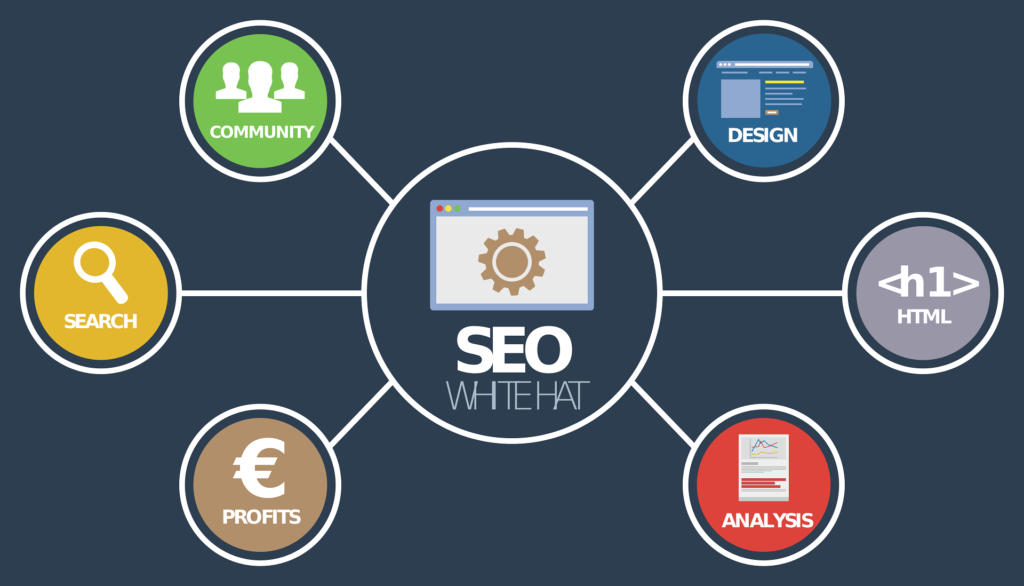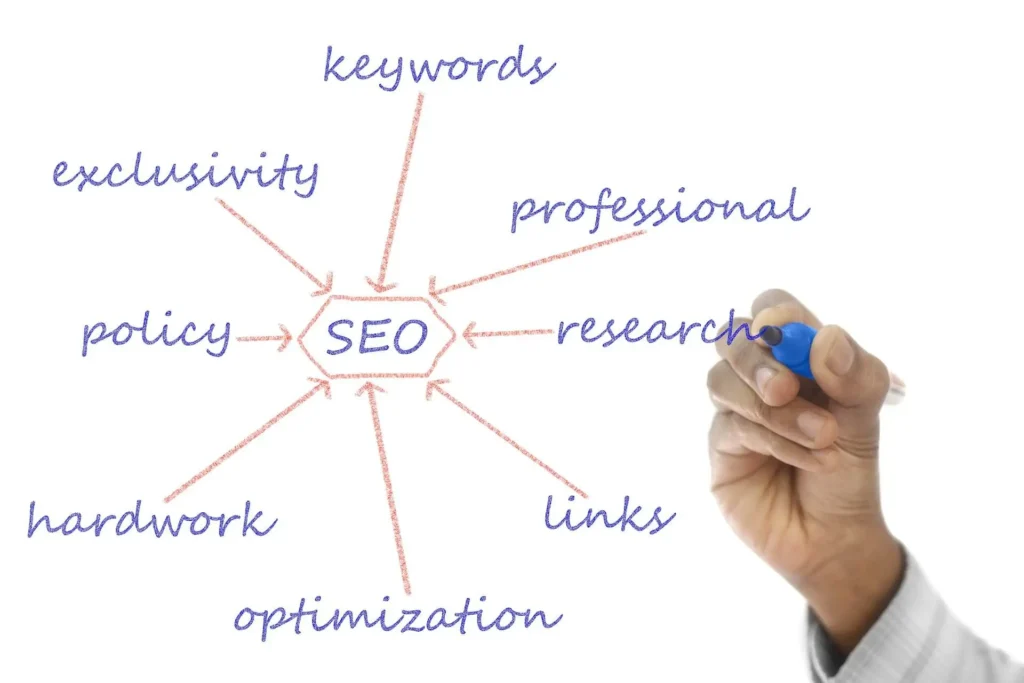What Is SEO – Search Engine Optimization?
What Is SEO – Search Engine Optimization?
SEO, or Search Engine Optimization, is the practice of optimizing websites to improve their visibility on search engines like Google. It involves a range of techniques and strategies aimed at ranking a website higher in search engine results pages (SERPs).>
The Role of a Search Engine Optimizer
A Search Engine Optimizer, often referred to as an SEO specialist, plays a crucial role in this process. Their expertise lies in understanding how search engines work and implementing strategies to ensure a website’s content aligns with the criteria search engines use to determine rankings. By optimizing various elements of a website, such as content, meta tags, and backlinks, an SEO specialist helps businesses achieve higher visibility, attract organic traffic, and ultimately improve their online presence.
The Purpose of SEO and Search Engine Marketing
At its core, the primary goal of SEO, or Search Engine Optimization, is to enhance a website’s visibility on search engines, such as Google. When potential customers search for products, services, or information, they often turn to search engines. By implementing SEO strategies effectively, businesses can ensure that their websites appear prominently in search engine results pages (SERPs).
This enhanced visibility is invaluable for attracting organic, non-paid traffic to a website. Organic traffic refers to visitors who find a website through a search engine without clicking on paid advertisements. It’s an essential aspect of any online marketing strategy.
Now, you might wonder about the relationship between SEO and Search Engine Marketing (SEM). While SEO focuses on optimizing a website to rank organically in search results, SEM encompasses a broader range of strategies, including paid advertising. SEM often involves paid ads, such as pay-per-click (PPC) campaigns, which appear at the top or side of SERPs. The synergy between SEO and SEM can maximize a website’s visibility and overall digital marketing effectiveness, ensuring that businesses are well-positioned to reach their target audience online.

How Search Engines Work
Understanding how search engines operate is fundamental to grasping the concept of SEO. Search engines are complex algorithms designed to provide users with relevant and valuable information in response to their queries. Here’s a simplified overview of how they work:
1. Crawling: Search engines use automated bots, often called crawlers or spiders, to scan the internet and gather information from web pages. These bots follow links from one page to another, creating a vast index of web content.
2. Indexing: Once a search engine’s bots crawl a web page, the information is indexed in a massive database. This index contains information about the content, structure, and keywords of each web page.
3. Ranking: When a user enters a search query, the search engine’s algorithm assesses the indexed web pages and determines their relevance to the query. The algorithm takes into account various factors, such as keyword usage, website authority, and user experience, to rank the pages in the search results.
4. Displaying Results: Finally, the search engine displays the ranked results in the form of a search engine results page (SERP). Users can click on the links in the SERP to access the web pages they find most relevant.
It’s important to note that search engines constantly update and refine their algorithms to provide users with the best possible search experience. Therefore, SEO specialists must stay informed about these changes and adapt their strategies accordingly to achieve higher search engine rankings.
Keyword Research and Local Search Engine Optimization
Keyword research is a cornerstone of effective SEO. It involves identifying and selecting specific words and phrases, known as keywords, that potential customers are likely to use when searching for products, services, or information related to your business.
The importance of keyword research lies in its ability to:
- Attract Targeted Traffic: By optimizing your website with relevant keywords, you increase the chances of attracting visitors genuinely interested in what you offer.
- Compete Effectively: Understanding which keywords your competitors are targeting allows you to compete effectively for the same audience.
- Enhance User Experience: Tailoring your content to include keywords naturally improves the overall user experience, making it easier for visitors to find what they’re looking for.
Local Search Engine Optimization (Local SEO) is a specialized approach for businesses targeting local markets. It’s particularly crucial for brick-and-mortar stores and service-based businesses operating in specific geographic areas. Local SEO involves optimizing your online presence to appear in local search results.
For local businesses, keyword research takes on added importance as it helps you identify location-based keywords that potential customers might use when searching for products or services in your area. By optimizing your website and content with these keywords, you improve your chances of being found by local customers looking for precisely what you offer.
Local SEO also includes strategies like optimizing your Google My Business profile, acquiring local citations, and encouraging customer reviews. These efforts combine to boost your visibility in local search results, ultimately driving foot traffic to your physical location or increasing local online sales.
On-Page SEO and High-Quality Content
On-page SEO refers to the optimization techniques applied directly to a web page to improve its search engine visibility. These techniques play a crucial role in making your content more appealing to both search engines and human visitors.
Here are some key on-page SEO techniques:
- Optimizing Title Tags: Crafting descriptive and keyword-rich title tags that accurately represent your content.
- Meta Descriptions: Writing compelling meta descriptions to encourage clicks from search results.
- Header Tags: Using header tags (H1, H2, H3, etc.) to structure content and improve readability.
- Keyword Usage: Strategically placing keywords throughout your content, including in headings, paragraphs, and image alt text.
- Internal and External Links: Incorporating relevant internal links to other pages on your website and high-quality external links to reputable sources.
- Image Optimization: Compressing and optimizing images for faster loading times and using descriptive file names and alt text.
- User-Friendly URLs: Creating clean and concise URLs that reflect the page’s content.
However, on-page SEO is not just about technical optimization; it goes hand in hand with content quality. High-quality, well-structured content is the foundation of a successful website. It not only keeps visitors engaged but also helps with search engine rankings.
Here’s why content quality matters:
- Relevance: Content should align with user intent and provide valuable information that matches the keywords it’s optimized for.
- Engagement: Engaging content keeps visitors on your site longer, reducing bounce rates and increasing the likelihood of conversions.
- Authority: Well-researched and authoritative content establishes your expertise in your industry or niche.
- Shareability: High-quality content is more likely to be shared on Social Media and linked to by other websites, increasing your online presence.
- Search Engine Rankings: Search engines prioritize content that provides a positive user experience, rewarding well-structured, informative content with higher rankings.
By combining effective on-page SEO techniques with high-quality content, you create a powerful combination that not only attracts search engine traffic but also keeps your audience engaged and satisfied.
Off-Page SEO and Building Authority
While on-page SEO focuses on optimizing the elements within your website, off-page SEO encompasses strategies that take place outside of your website but still impact your search engine rankings significantly.
Two key factors of off-page SEO are:
Backlinks: These are links from other websites that point to your site. High-quality backlinks from authoritative sources are like votes of confidence in your content. Search engines view them as signals of trustworthiness and relevance.
Social Signals: Social media activity, including likes, shares, and comments, can indirectly influence your SEO. While search engines don’t use social signals as direct ranking factors, strong social engagement can lead to increased visibility and, potentially, more backlinks.
Building online authority is a crucial aspect of off-page SEO. Authority is earned through a combination of factors:
Quality Content: Consistently producing high-quality, valuable content establishes your authority in your niche or industry.
Backlinks: Earning backlinks from reputable websites in your field further boosts your authority.
Social Presence: Active engagement on social media platforms can help you connect with your audience and build authority in your industry.
Reputation Management: Maintaining a positive online reputation, including managing reviews and feedback, enhances your credibility.
Consistency: Consistency in delivering quality content and engaging with your audience over time solidifies your authority.
Why does building authority matter for SEO? Search engines aim to deliver the best possible results to users. Websites with established authority are more likely to offer valuable and reliable information. Consequently, they tend to rank higher in search results, attracting more organic traffic.
By focusing on off-page SEO factors and actively building your online authority, you not only enhance your search engine rankings but also position yourself as a trusted resource within your industry.
Technical SEO and Website Optimization
Technical SEO is the foundation that supports your website’s search engine optimization efforts. It focuses on optimizing the technical aspects of your site to ensure it’s both search engine-friendly and user-friendly.
Key elements of technical SEO include:
Website Speed: Fast-loading pages improve user experience and can positively impact search engine rankings.
Mobile Friendliness: With the rise of mobile browsing, ensuring your site is mobile-responsive is essential for SEO and user satisfaction.
Structured Data: Implementing structured data markup can enhance the appearance of your content in search results through rich snippets.
XML Sitemaps: Creating XML sitemaps helps search engines crawl and index your site more efficiently.
Robots.txt: Properly configuring your robots.txt file guides search engine crawlers on how to interact with your site.
Canonicalization: Managing canonical tags helps prevent duplicate content issues and maintains a clear site structure.
Security (HTTPS): Ensuring your site uses a secure HTTPS connection is not only crucial for user trust but also a factor in search engine ranking algorithms.
The significance of technical SEO elements cannot be overstated. Beyond their direct impact on search engine rankings, they enhance user experience. Visitors to your site expect fast loading times, mobile accessibility, and secure browsing. Meeting these expectations can lead to lower bounce rates and increased engagement, both of which can positively affect your SEO efforts.
Additionally, technical SEO ensures that search engine crawlers can access and understand your website’s content. When your site is optimized technically, it becomes easier for search engines to index your pages accurately, leading to better rankings.
Therefore, paying attention to the technical aspects of your website is not only an SEO best practice but also a fundamental component of providing a positive user experience.

Send a message. We will be in touch.
Local SEO Strategies and Targeting Local Audiences
Local SEO, or Local Search Engine Optimization, is a specialized approach tailored to businesses that serve specific geographic areas. If your business relies on attracting customers within a particular city, region, or locality, local SEO is essential for your online success.
Here’s why local SEO is crucial:
Relevance: Local SEO ensures your business appears in search results when users in your area search for products or services you offer.
Competitive Edge: Optimizing for local search can help you stand out among competitors targeting the same audience.
Mobile Traffic: A significant portion of local searches happens on mobile devices, making local SEO vital for attracting mobile users.
Here are some key strategies for effective local SEO:
Google My Business (GMB) Optimization: Claim and optimize your Google My Business profile. Ensure your business information, including name, address, phone number (NAP), and business hours, is accurate and up to date.
Local Keyword Targeting: Research and use location-specific keywords in your content and meta tags to signal your relevance to local searchers.
Online Reviews: Encourage satisfied customers to leave positive reviews on platforms like Google, Yelp, and Facebook. Monitor and manage your online reputation.
Local Citations: Ensure your business information is consistent across online directories and local listings. Citations play a role in local search ranking.
Localized Content: Create content that speaks to local interests and needs. Highlight community involvement and local events.
By implementing these strategies and optimizing for local search, you increase your chances of being discovered by potential customers in your area. Local SEO can be a game-changer for businesses aiming to capture their local market effectively.
White Hat vs. Black Hat SEO and Ethical Practices
When it comes to SEO, there are two distinct approaches: ethical (white hat) SEO and unethical (black hat) SEO. Understanding the difference between these practices is essential for maintaining a positive online reputation and long-term SEO success.
White Hat SEO:White Hat SEO refers to ethical and legitimate SEO practices that align with search engine guidelines and aim to provide value to users. These practices include:
Quality Content: Creating high-quality, informative content that genuinely benefits your audience.
Keyword Research: Conducting thorough keyword research to target relevant and valuable keywords.
On-Page Optimization: Optimizing your website’s content, meta tags, and structure to improve user experience.
Building Backlinks: Earning high-quality backlinks through natural and ethical means.
Transparency: Providing accurate and transparent information about your business and products or services.
Black Hat SEO, on the other hand, involves unethical and manipulative techniques that attempt to exploit search engine algorithms for quick gains. These practices can include:
Keyword Stuffing: Overloading content with excessive keywords in an attempt to manipulate rankings.
Cloaking: Showing different content to search engines and users, a deceptive practice.
Paid Links: Purchasing backlinks from low-quality or irrelevant websites, which can result in penalties.
Hidden Text and Links: Using hidden elements to manipulate rankings or deceive users.
Doorway Pages: Creating low-quality pages designed solely for ranking, not user value.
The importance of adhering to ethical (white hat) SEO practices cannot be overstated. Search engines continuously update their algorithms to identify and penalize black hat techniques. Websites that engage in black hat SEO can face severe consequences, including ranking drops and removal from search engine results.
By focusing on ethical practices and providing value to your audience, you not only build a strong online presence but also safeguard your website’s long-term success in the ever-evolving world of SEO.
White Hat vs. Black Hat SEO and Ethical Practices
When it comes to SEO, there are two distinct approaches: ethical (white hat) SEO and unethical (black hat) SEO. Understanding the difference between these practices is essential for maintaining a positive online reputation and long-term SEO success. White Hat SEO: White Hat SEO refers to ethical and legitimate SEO practices that align with search engine guidelines and aim to provide value to users. These practices include:- Quality Content: Creating high-quality, informative content that genuinely benefits your audience.
- Keyword Research: Conducting thorough keyword research to target relevant and valuable keywords.
- On-Page Optimization: Optimizing your website’s content, meta tags, and structure to improve user experience.
- Building Backlinks: Earning high-quality backlinks through natural and ethical means.
- Transparency: Providing accurate and transparent information about your business and products or services.
- Keyword Stuffing: Overloading content with excessive keywords in an attempt to manipulate rankings.
- Cloaking: Showing different content to search engines and users, a deceptive practice.
- Paid Links: Purchasing backlinks from low-quality or irrelevant websites, which can result in penalties.
- Hidden Text and Links: Using hidden elements to manipulate rankings or deceive users.
- Doorway Pages: Creating low-quality pages designed solely for ranking, not user value.

Measuring SEO Success and Key Performance Indicators
Measuring the success of your SEO efforts is essential to track progress, make informed decisions, and continuously improve your strategy. Key Performance Indicators (KPIs) are valuable metrics that provide insights into your SEO performance.
Common SEO KPIs include:Organic Traffic: Monitoring the number of visitors who arrive at your website through organic (non-paid) search results.
Keyword Rankings: Tracking the positions of your target keywords in search engine results pages (SERPs).
Click-Through Rate (CTR): Measuring the percentage of users who click on your search result compared to the total number of impressions.
Bounce Rate: Assessing the percentage of visitors who leave your site after viewing only one page.
Conversion Rate: Calculating the percentage of visitors who take desired actions, such as making a purchase or filling out a contact form.
Backlink Quality: Evaluating the quality and authority of websites linking to your site.
Tools like Google Analytics and Google Search Console are invaluable for tracking these KPIs and gaining deeper insights into your SEO performance.
Google Analytics:Google Analytics provides detailed information about your website’s traffic, including the sources of traffic, user behavior, and conversion rates. It allows you to track the performance of specific pages, see which keywords are driving traffic, and monitor user demographics.
Google Search Console:Google Search Console offers data specific to how your site performs in Google search results. It provides information about indexing status, search queries that lead to your site, and any issues that may affect your rankings. Additionally, it allows you to submit sitemaps and monitor your site’s mobile usability.
By regularly reviewing these KPIs and using tools like Google Analytics and Google Search Console, you can gauge the effectiveness of your SEO strategy, make data-driven optimizations, and ultimately improve your website’s visibility and performance in search engines.
The Evolving Nature of SEO and Staying Updated
SEO is a dynamic field that has undergone significant evolution over the years. Understanding these changes and adapting to them is essential for maintaining a strong online presence.
How SEO Techniques Have Evolved:1. Content Quality: Search engines now prioritize high-quality, informative content that meets user intent. Thin or spammy content is no longer effective.
2. Mobile Optimization: With the rise of mobile usage, mobile optimization has become a critical ranking factor. Websites must be mobile-responsive for better user experience.
3. User Experience: Search engines consider factors like page speed, website security, and user engagement as signals of a positive user experience.
4. Voice Search: The growth of voice-activated devices has led to the need for optimizing for voice search queries.
5. Semantic Search: Search engines now understand context and intent, so content should focus on addressing user needs comprehensively.
6. Local SEO: The importance of local search has increased, with more users seeking nearby businesses and services.
The Importance of Staying Updated:SEO is not a one-time task but an ongoing effort. Search engines frequently update their algorithms to deliver the best results to users. Staying updated with these changes and industry trends is crucial for SEO success.
How to Stay Updated:1. Follow Industry Blogs: Regularly read reputable SEO blogs and news sources to stay informed about algorithm updates and best practices.
2. Attend Webinars and Conferences: Participate in webinars and conferences featuring SEO experts to gain insights and network with professionals.
3. Join SEO Communities: Join online SEO communities and forums to exchange knowledge and experiences with peers.
4. Continuous Learning: Invest in ongoing learning and SEO training to keep your skills up to date.
The evolving nature of SEO means that what works today may not work tomorrow. By staying informed and adapting your strategy accordingly, you can navigate the ever-changing landscape of search engine optimization and continue to drive success for your website.
Summary of Key SEO Insights
As we wrap up, let’s recap the essential takeaways:
SEO, or Search Engine Optimization, is the process of optimizing your website to improve its visibility on search engines.
Search Engine Optimizers play a crucial role in enhancing website visibility and driving organic traffic.
SEO is about providing value to users, which aligns with the broader strategy of Search Engine Marketing.
Understanding how search engines work, including algorithms, is fundamental to SEO success.
Keyword research and optimization, as well as local SEO, are vital for targeting the right audience.
On-page SEO techniques and high-quality content are the cornerstones of effective optimization.
Off-page SEO, including building authority through backlinks and social signals, is equally essential.
Technical SEO elements, such as site speed and mobile optimization, are crucial for user experience and rankings.
Local SEO strategies are essential for businesses targeting specific geographic areas.
Adhering to ethical (white hat) SEO practices is a must, as black hat techniques can lead to penalties.
Measuring SEO success through KPIs and using tools like Google Analytics and Google Search Console is vital for improvement.
SEO is an evolving field, and staying updated with industry changes is key to ongoing success.
Now, it’s time to take action. Start implementing basic SEO practices on your website to improve your online presence. Remember that SEO is not a one-time effort but an ongoing journey.
If you have questions, need guidance, or want to take your SEO efforts to the next level, remember that Dhubab is a Digital Marketing Agency with 15+ Years of Honest Expertise Experience Tailored to Your Digital Marketing Business’s Success. We’re here to assist you on your path to digital success.
Get started today and unlock the full potential of your online presence with Dhubab, founded with a vision to empower businesses with effective digital strategies.
Visit Dhubab – Your SEO Partner

Dhubab: Your Digital Marketing Agency
At Dhubab, a Digital Marketing Agency with 15+ years experience, we’re not just another digital marketing agency. We are your dedicated partner in navigating the dynamic digital landscape and achieving your business goals. Discover how our services can benefit business owners like you and why choosing Dhubab is the smartest move for your digital marketing success.
Our Services
Dhubab offers a comprehensive suite of digital marketing services designed to empower your business in the online world. Our services include:
- **Web Design:** Crafting visually appealing and user-friendly websites that make lasting impressions on your visitors.
- **Content Writing:** Creating engaging and informative content that resonates with your audience and drives conversions.
- **SEO Mastery:** Optimizing your online presence to rank higher on search engines, increasing your visibility to potential customers.
- **Backlink Strategies:** Building high-quality backlinks that enhance your website’s authority and credibility.
- **Lead Funnels:** Developing effective lead generation funnels that turn prospects into loyal customers.
- **Email Marketing:** Crafting compelling email campaigns that nurture relationships and drive results.
Benefits for Business Owners
By choosing Dhubab as your digital marketing partner, you can enjoy a multitude of benefits, including:
- **Expertise:** Access to over 15 years of honest expertise in the digital marketing arena, tailored to your business’s unique needs.
- **Strategic Guidance:** Our mission is to navigate the digital frontier alongside you, offering expert guidance and custom-tailored solutions.
- **Online Excellence:** Elevate your online presence, reach new heights, and excel in the digital landscape with our proven strategies.
- **Business Growth:** Every business deserves a chance to excel online, and we’re here to make that a reality for you.
Why Choose Dhubab
There are countless digital marketing agencies out there, but Dhubab stands out for several compelling reasons:
- **Experience:** With over a decade of experience in digital marketing, we possess the knowledge and insights to drive real results for your business.
- **Proven Strategies:** Our strategies have consistently delivered explosive growth for our clients, making us a trusted partner in their success stories.
- **Client-Centric Approach:** We believe in collaborating closely with our clients, understanding their unique challenges, and tailoring our solutions accordingly.
- **Transparent Communication:** Expect clear and open communication throughout our partnership, ensuring you’re always in the loop regarding your digital marketing efforts.
Let Us Elevate Your Digital Presence
If you’re a business owner looking to thrive in the digital realm, it’s time to take action. Let Dhubab be your trusted digital marketing partner and witness the transformation of your online presence. Together, we’ll navigate the digital frontier, overcome challenges, and seize opportunities for growth.
Don’t wait any longer. Contact Dhubab today and embark on a journey toward digital marketing success. Your business deserves nothing less.







